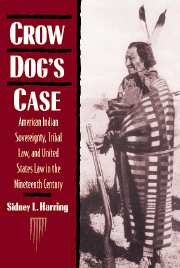 Crow Dog's Case
Crow Dog's Case Published online by Cambridge University Press: 23 September 2009
The contradiction between tribal sovereignty and a colonial model of imposed law was nowhere more publicly debated than in U.S. policy toward the Indian nations in eastern Oklahoma. The Cherokee, Creek, Choctaw, Chickasaw, and Seminole – the Five Civilized Tribes – all had purchased their lands in fee simple from the government of the United States in the 1830s (1850s in the case of the Seminole) as a part of complex treaty negotiations accompanying the surrender of their southeastern lands. Even Andrew Jackson had argued that only by moving beyond the boundaries of the United States to the Indian Territory could the tribes be “perpetuated as Nations and enjoy the right of living under their own law.” The tribes' right to maintain their own laws forever was deeply embedded in the consciousness of the Indian people, who all knew by the time of removal that only through strong defense of their traditions would they survive.
All of these tribes, following the Cherokee model, constituted themselves as “nations” in the West, and that usage became common in the white press and in government relations with them. The question of tribal sovereignty that later emerged in Crow Dog had already been settled in these Indian nations. The state's greed for tribal lands and Andrew Jackson's “Indian removal” policy therefore indirectly reinforced mid-nineteenth-century tribal sovereignty in three ways: first, the Five Civilized Tribes, as well as other eastern tribes, acquired political experience in dealing with the United States that they used as the theoretical foundation for their nations in the West, not only calling themselves “nations” but getting treaties from the United States that recognized that status.
To save this book to your Kindle, first ensure no-reply@cambridge.org is added to your Approved Personal Document E-mail List under your Personal Document Settings on the Manage Your Content and Devices page of your Amazon account. Then enter the ‘name’ part of your Kindle email address below. Find out more about saving to your Kindle.
Note you can select to save to either the @free.kindle.com or @kindle.com variations. ‘@free.kindle.com’ emails are free but can only be saved to your device when it is connected to wi-fi. ‘@kindle.com’ emails can be delivered even when you are not connected to wi-fi, but note that service fees apply.
Find out more about the Kindle Personal Document Service.
To save content items to your account, please confirm that you agree to abide by our usage policies. If this is the first time you use this feature, you will be asked to authorise Cambridge Core to connect with your account. Find out more about saving content to Dropbox.
To save content items to your account, please confirm that you agree to abide by our usage policies. If this is the first time you use this feature, you will be asked to authorise Cambridge Core to connect with your account. Find out more about saving content to Google Drive.